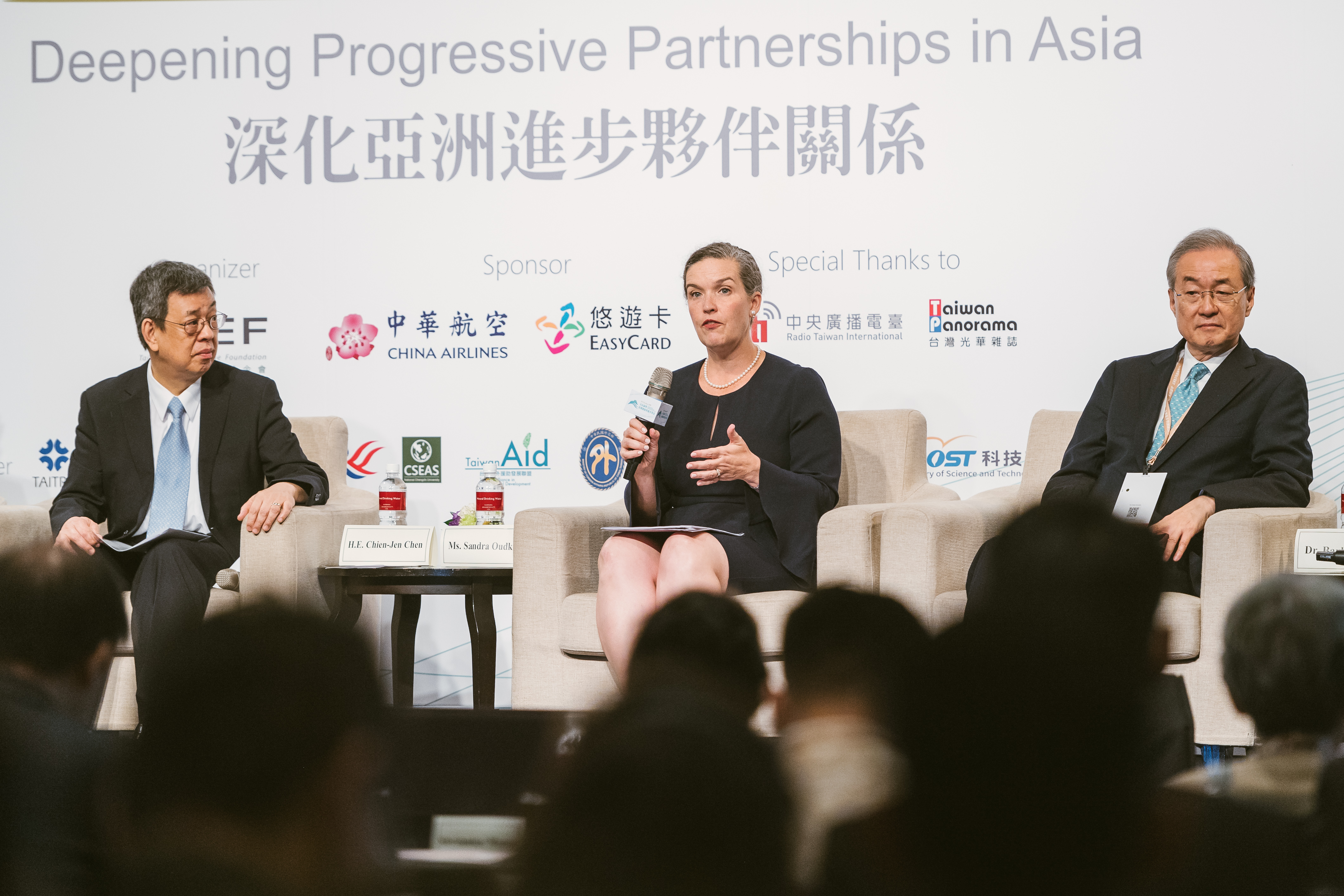TAIPEI, Taiwan—U.S. officials highlighted the importance of Taiwan as a diplomatic partner during an international forum on Oct. 9. In contrast, they explained how the Chinese regime has engaged in unfair trade practices.
The Yushan Forum, hosted by Taiwan–Asia Exchange Foundation, a local think tank, was held for two days beginning on Oct. 8.
On the final day of the forum, a roundtable dialogue with the theme “Envisioning Asia” was presided over by Taiwan’s Vice President Chen Chien-jen. Five speakers took part in the dialogue, including India’s former foreign secretary Shivshankar Menon; and Sandra Oudkirk, the U.S. State Department’s Deputy Assistant Secretary for Australia, New Zealand, and the Pacific Islands.
“The United States values Taiwan as a partner. We have a shared vision for a free and open Indo–Pacific,” said Oudkirk in her remarks.
She added: “Our Indo–Pacific vision enshrines concepts that are shared by many in the region, including in Taiwan’s New Southbound Policy.
”U.S. President Donald Trump first spoke of his Indo–Pacific strategy as one that seeks to keep the region free and open, with “robust trade relationships rooted in the principles of fairness and reciprocity,” during the APEC Summit in Vietnam in November 2017.
Meanwhile, the New Southbound Policy has been one of Taiwan President Tsai Ing-wen’s most important foreign policies since she was elected to office in 2016. Under the policy, Taiwan is to foster stronger economic and trade ties with nations of the Association of Southeast Asian Nations (ASEAN), South Asia (India, Pakistan, Afghanistan), New Zealand, and Australia.
Oudkirk added that both the Indo–Pacific strategy and New Southbound Policy are guided by a “commitment to upholding a rules-based order in the region,” including by encouraging private sector investment in Indo–Pacific nations.
She explained that developing countries in the region need about $1.5 trillion to 2 trillion in infrastructure investment every year, and only the private sector, not governments, could provide that amount. So, it would be important that the United States create conditions that will attract private sector investment into the region.
The Taiwanese government has several incentive policies to encourage the island’s private sector, including NGOs and academic and cultural associations, to take part in the New Southbound Policy, including offering favorable loans, assisting companies in overseas recruitment, providing funds to support companies to take part in overseas exhibitions, and more.
“The greater the role of the private sector, the more sustainable economic growth can be. By contrast, state-directed, state-dominated investment frequently results in corruption, inefficiency, unevenly distributed economic growth, and ultimately public backlash,” Oudkirk warned.
Though Oudkirk did not name any country, her remark is as an indirect reference to China, whose flagship foreign policy of One Belt, One Road (OBOR, also known as Belt and Road), has been criticized for putting developing countries in a “debt trap” when countries are unable to pay back Chinese loans.
Oudkirk also praised Taiwan for choosing to voluntarily forgo its “special and differential” treatment in future negotiations with the World Trade Organization (WTO) in 2018. She added: “This [Taiwan’s] announcement set an encouraging example for WTO members.”
By contrast, Trump has repeatedly slammed China for continuing to declare itself a developing nation at the WTO, which allows China to enact protectionist policies such as providing government subsidies to domestic agricultural sectors and imposing high trade barriers.
Oudkirk added that the Asia–Pacific Economic Cooperation (APEC), of which the United States and Taiwan are members, is the “economic pillar” for advancing the former’s Indo–Pacific vision. She applauded Taiwan for playing a “valuable and constructive role” in the APEC.
“Taiwan plays a key role in maintaining a free and open Indo–Pacific, and this is true in terms of economic, security, and governance. Taiwan is a role model for the Indo–Pacific region and beyond,” she added.
Oudkirk was also in Taiwan on Oct. 7, when she participated in the Pacific Islands Dialogue, an inaugural forum hosted by Taiwan’s foreign ministry and the American Institute in Taiwan, the U.S. government’s de-facto embassy.
This article is published on The Epoch Times.
